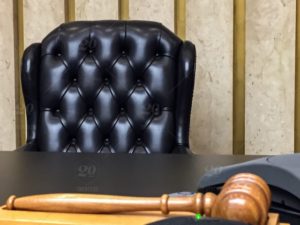Unlicensed practitioner entitled to judicial appeal despite lack of formal proceedings by board
 A man engaged in unregistered engineering can challenge a state board’s conclusion that he was required to obtain a license, even where the board had never brought formal proceedings against him, the Supreme Court of Arizona ruled August 10. A judicial case was the only avenue open to the subject of the case because the board’s future actions were uncertain, the court held.
A man engaged in unregistered engineering can challenge a state board’s conclusion that he was required to obtain a license, even where the board had never brought formal proceedings against him, the Supreme Court of Arizona ruled August 10. A judicial case was the only avenue open to the subject of the case because the board’s future actions were uncertain, the court held.
The unlicensed practitioner in the case, Greg Mills, builds electronic circuits for consumer products, but did not register with the board. In 2019, a customer filed a complaint with the board regarding Mills’s fees and his lack of registration.
The board found that Mills had engaged in the unregistered practice of engineering, but Mills refused to sign two proposed consent orders put forward by the board and instead brought suit seeking a declaration that the requirement that he register as an engineer violated the Arizona Constitution.
Despite its conclusion that Mills was engaged in unauthorized practice, the board never brought formal proceedings against him. Because of that, a state superior court ruled that Mills had failed to exhaust his administrative remedies and dismissed the case. Mills appealed, and the case eventually rose to the Supreme Court, which ruled in his favor and remanded the case for further proceedings.
On appeal, Mills argued that he was not required to exhaust his administrative remedies in the case, and the Court agreed. “[A] litigant is required to exhaust administrative remedies only if he has access to a statutorily prescribed administrative remedy,” wrote Vice Chief Justice Ann Timmer.
“Although Mills could raise his constitutional challenges in an appeal from the Board’s final administrative decision . . . it is uncertain whether the Board will make that decision because it has not initiated formal proceedings against Mills and is not statutorily required to do so.” Further, no mechanism exists in the board’s regulations that would allow Mills to request the initiation of such a formal proceeding.
“The lack of an available administrative path for bringing Mills’s claims before the superior court . . . persuades us that the legislature did not intend an appeal of a final, adverse Board decision as the exclusive remedy available to Mills . . . If that were so, after asserting Mills’ statutory violations and assessing escalating fines in proposed consent agreements, the Board could delay initiating formal proceedings for years or never initiate proceedings that would culminate in an appealable decision, leaving Mills in legal limbo, unable to know with certainty whether he is lawfully required to register as an engineer.”
The exhaustion doctrine should not apply to Mills’s case, the judge added, because only a court, and not the board, has the authority to declare the constitutionality of the statutes and rules that Mills had challenged. “Requiring Mills to await a (possible) final Board decision before raising his constitutional challenges on appeal would be pointless because the Board is powerless to resolve those challenges,” she wrote.
Mills also lacked standing to bring his lawsuit, the board argued, because a factual dispute existed as to whether Mills was required to register with the board, and, until the board ruled on that dispute, Mills had not suffered any injury that a court could redress.
The court again disagreed. No factfinding was necessary for Mills to be able to challenge the constitutionality of the registration law, Justice Timmer wrote. And any factual disputes can be determined by a court hearing his case. Additionally, Mills was not required to have been injured before his claims became able to be decided by a court, as the key to that issue under Arizona law was simply whether a controversy existed between himself and the board.
In this case, such a controversy did exist, as the board had declared Mills in violation of the law and had offered to resolve the situation through a consent agreement. “Mills has a real and present need to know whether the pertinent statutes are constitutional and can therefore prevent him from continuing to work as an engineer without registering with the Board.”

